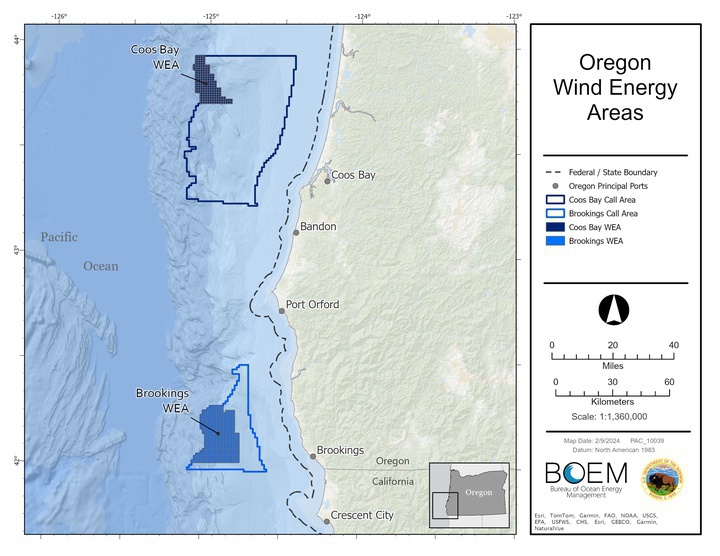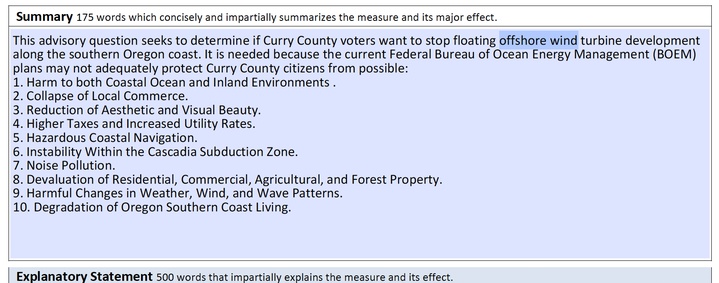Jessica Cejnar Andrews / Thursday, Aug. 8, 2024 @ 4:58 p.m. / Environment, Local Government
Curry County Commissioners Approve Offshore Wind Advisory Question For November Ballot

The U.S. Bureau of Ocean Energy Management is expected to hold lease auctions for two areas off the Southern Oregon Coast to renewable energy developers in October. | Map courtesy of BOEM
Curry County commissioners on Wednesday greenlit an advisory question for the November ballot asking voters “Should offshore floating wind turbine development along the Curry County Oregon Coast be stopped?”
Their unanimous vote comes the day after Coos County approved a similar ballot question. Opponents of offshore wind energy from Bandon said the Curry County measure was better.
Curry County commissioners approved the advisory question despite receiving an email from Ryan Nelson, a political and legislative representative with Labors International Union of North America Local 737, stating that the county has no legal authority to ban offshore wind energy projects.
Nelson urged commissioners not to waste voters’ time and county resources on the advisory question, according to Board Chairman Brad Alcorn, who read the statement into the record.
“When I hear that bull, that tells me absolutely the right thing to do is to put this on a ballot as an advisory question so they, BOEM, hear the people’s voice,” he told his colleagues.
Curry County commissioners have been unyielding in their opposition to offshore wind energy development off the Brookings and Gold Beach and Coos County coasts since at least last autumn.
During a public comment period the Bureau of Ocean Energy Management held in October that focused on the Brookings and Coos County call areas, the Board appointed Commissioner Jay Trost to BOEM’s Oregon Intergovernmental Renewable Energy Task Force.
In March, commissioners approved a resolution calling on BOEM to coordinate with local governments on actions that may affect their recreational areas, invoking the Coordination Development Act of 1963.

Summary of the advisory ballot measure that will go before voters in November asking their. | Screenshot
On July 3, commissioners brought up the idea of an advisory question for the Nov. 5 ballot as a way of gauging public opinion on the issue and provide ammunition for any legal action they may take to keep to keep floating wind platforms from sprouting up in their aquatic backyard.
On Wednesday, Trost mentioned the resolution he and his colleagues approved in March and asked Ted Fitzgerald, Curry County’s director of operations and legal counsel, to send a demand letter to BOEM to get them to move forward with the coordination process.
“They have to coordinate,” Trost said. “That’s the one piece we haven’t done is send a demand letter.”
BOEM is expected to hold a lease auction for two areas in the Brookings and Coos Bay Wind Energy areas in October. These two areas total 194,995 acres and have the potential to power more than a million homes, according to an April 30 news release from the Department of the Interior.
During a conversation with the Wild Rivers Outpost on July 11, Nicole Hughes, executive director for Renewable Northwest, said once BOEM holds its lease auction in October, renewable energy companies have the opportunity to determine if a project is feasible.
This process will include financial analyses, geological studies and meetings with people in the community, she said.
If a company decides they can build an offshore wind energy project off the coast, it will go back to BOEM, which triggers another round of environmental impact studies, mitigation requirements and other review measures.
“We’re looking at a 10-year process,” Hughes told the Outpost in July.
On Wednesday, Diane Rich, Marty Kuhrt and Rob Taylor, members of Oregonians Against Wind Turbines from Coos County, said most people they speak with don’t know about the possible offshore wind energy development that could occur.
“We have 50 to 60 that are constantly active about this and are constantly protesting,” Kuhrt said. “We had a meeting at the Sawdust Theater in Coquille that was put on by one of the commissioners and, oddly enough, we had the place packed and it was people from both sides of the aisle. People that were far left [and] far right, everybody came to that meeting and said wind mills are a bad idea.”
Rich, claiming that any power offshore wind turbines generate will be expensive, said their proliferation off the coast will be a loss for Coos, Curry and Douglas counties.
"If we can do anything we can to prove the citizens that live here don't want this, all the better," she said. "It's really up to us to show citizens who don't even know what's going on and, quite frankly, that's got to be 80 percent. We're out there hour after hour and people will come up and they're completely oblivious. We got to get an awareness program."
Taylor, a Bandon resident who hosts the Rob Taylor Report podcast, said Oregonians Against Wind Turbines has allies fighting offshore wind energy on the East Coast and has been contacted by the Pacific Legal Foundation and other groups who would be “willing to help us once we get into this battle — you know how expensive lawsuits can be.”
Taylor said he has experience stopping an expansion of the Bandon Marsh by the U.S. Fish and Wildlife Service. Coos County commissioners had placed an advisory question on the ballot asking voters if they want the marsh expansion. Out of a 70 percent voter turnout, according to Taylor, 72 percent said “hell no.”
“Coos County was the smallest county ever to defeat the largest wetland restoration project on the West Coast,” he said. “You can use this vote as a blunt force object to bash in their wall of resistance they’re going to come at you with. You’ll have corporations coming at you and if you get a vote of 60 to 70 percent of the people saying hell no, what corporation is going to want to come in here and lease these call areas?”
Taylor also mentioned a $2.5 million project the U.S. Department of Energy has asked Oregon State University to lead. According to him, those funds went the psychology department to “do a psy-ops on us so no matter how you answered the question, it was going to come out that you were in favor of the windmill project.”
According to an Oct. 5, 2023 news release from OSU, the university is leading a team of researchers who will interview and survey coastal residents to understand their concerns, values and preferences regarding offshore wind energy.
That team includes researchers from the University of Delaware, the University of Maine, Cal Poly Humboldt and the University of Washington.
OSU is also partnering with the Affiliated Tribes of Northwest Indians, Renewable Northwest — a nonprofit renewable energy policy advocacy organization operating in the Bonneville Power Administration footprint — as well as Sea Grant programs in Oregon, Washington and Maine.
CLICK TO MANAGE